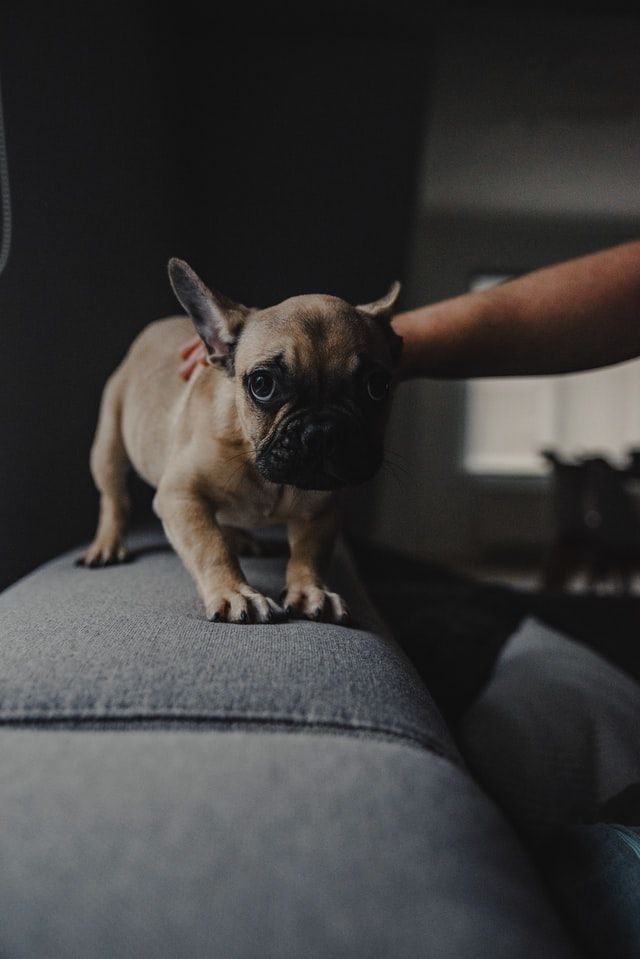
A veterinarian, even in Clarksburg, Urbana and Germantown, deals with dog anxiety every day. Pets are often anxious coming into the office, but anxiety in dogs is common at home too. It occurs for many reasons and is expressed in many different ways.
Anxiety in dogs is expressed through panting, barking, pacing, hiding, trembling, crouching, tail-tucking, a whale eye (looking sideways so the whites of the eyes show), pinned ears, drooling, tense facial muscles, tense body position, growling, attempts to escape, destruction and biting.
Common reasons for anxiety are separation from their humans, storms/loud noises, car rides, other dogs, children and strangers. It can also be part of dementia (also called Cognitive Dysfunction) in an older dog. Occasionally dogs in pain exhibit the same symptoms.
Recognizing the symptoms of anxiety in dogs by veterinarians and dog owners is key. Some anxiety symptoms are obvious. Others can be more subtle and even look like excitement. A dog uncomfortable during contact with a young child may only tense and show a whale eye to express discomfort. That dog may never do anything else or it may end up snapping or biting another time to show it’s discomfort and lack of ability to escape.
Anxiety in dogs in Claksburg, Urbana and Germantown is a result of many factors. Dogs are born with a certain personality. Their early socialization experiences have a strong influence on their future responses. Many puppies don’t get the socialization they need to limit or prevent anxiety in dogs. Finally their training, experiences and how we respond to them on a daily basis all impacts their overall responses.
If you see anxiety symptoms in your dog, start a discussion with your veterinarian at Clarksburg Animal Hospital. The earlier you intervene the better. Small changes early on make a big difference. Our first goal at Clarksburg Animal Hospital is to be sure there is no underlying physical problem causing worsening anxiety. Joint or back pain, dental pain, a urinary tract infection or gastrointestinal issues (even mild and occasional) may contribute to or cause anxiety. If physical issues are treated and the behavior persists, training or counter-conditioning is usually needed. Sometimes both are needed at the same time.
There are simple things you can do every day. Dogs with anxiety like predictability and routine. Keep the day as predictable as possible for them. Don’t put them in situations that trigger anxiety like small children, friends (strangers to them) over to visit, crowds, other dogs, etc. During storms, vet visits, walking past other dogs – you have to stay calm and go about your business. As a leader, you can calm your dog by remaining calm yourself. Telling them it’s ok reinforces you think there is a concern. A dog owner getting anxious about your dog’s reaction only reinforces the behavior. They only know you are worried in that situation.
There are many training techniques to help dogs to think more positively about the situation that causes anxiety. The best plan varies with you, your dog, their food motivation and their level of anxiety. Individual training is invaluable and typically necessary for success. Occasionally, a Board Certified Veterinary Behaviorist is needed to take things a bit further than the trainer.
Other options for managing anxiety also exist. There are a variety of supplements which can help about half the time. There are calming pheromones in collars, sprays and diffusers to help relax anxious dogs. Some vets even use the pheromones in their exam rooms and kennels. There are shirts that hug your dog to make them calmer, not just for storms but in other situations causing anxiety. There is even a probiotic for anxiety that is very effective for some dogs. If all else fails, there are anxiety medications for both short-term and chronic anxiety.
Ultimately, there will be some trial and error with supplements, training techniques, managing underlying medical conditions, your approach and possibly medications. Your expectations have to be reasonable. Change takes time and your dog will always have anxiety. With the correct combination of tools for your dog from Clarksburg Animal Hospital, their anxiety will improve over months to years. The goal is to keep it managed safely and to improve everyone’s quality of life in Clarksburg, Urbana and Germantown.




